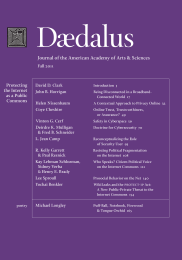
What are the Consequences of Being Disconnected in a Broadband-Connected World?
The evolution of the Internet in the past decade — from a slow, stationary, and primarily communications-based technology to a mobile, fast technology that supports a range of communication, participatory, and transactional applications — has made access more valuable, and disconnection more consequential, for individuals. This evolution means that stakeholders should embrace a different framing of the digital divide, focusing on the costs of digital exclusion.
A Contextual Approach to Privacy Online
Recent media revelations have demonstrated the extent of third-party tracking and monitoring online, much of it spurred by data aggregation, profiling, and selective targeting. How to protect privacy online is a frequent question in public discourse and has reignited the interest of government actors. In the United States, notice-and-consent remains the fallback approach in online privacy policies, despite its weaknesses.
Online Trust, Trustworthiness, or Assurance?
Every day, individuals around the world retrieve, share, and exchange information on the Internet. We interact online to share personal information, find answers to questions, make financial transactions, play social games, and maintain professional and personal relationships. Sometimes our online interactions take place between two or more humans. In other cases, we rely on computers to manage information on our behalf. In each scenario, risk and uncertainty are essential for determining possible actions and outcomes.
Safety in Cyberspace
Safety in cyberspace continues to be an elusive objective. This essay explores various metaphors to aid thinking about the means by which safety might be increased.
Doctrine for Cybersecurity
A succession of doctrines for enhancing cybersecurity has been advocated in the past, including prevention, risk management, and deterrence through accountability. None has proved effective.
Reconceptualizing the Role of Security User
The Internet is not the only critical infrastructure that relies on the participation of unorganized and technically inexpert end users. Transportation, health, waste management, and disaster preparedness are other areas where cooperation between unorganized citizens who lack experience with the domain has increased resiliency, reduced social costs, and helped meet shared goals. Theories of community-based production and management of the commons explain this type of cooperation, both offline and online.
Resisting Political Fragmentation on the Internet
Must the Internet promote political fragmentation? Although this is a possible outcome of personalized online news, we argue that other futures are possible and that thoughtful design could promote more socially desirable behavior. Research has shown that individuals crave opinion reinforcement more than they avoid exposure to diverse viewpoints and that, in many situations, hearing the other side is desirable.
Who Speaks? Citizen Political Voice on the Internet Commons
Using an August 2008 representative survey of Americans conducted by the Pew Internet & American Life Project, we investigate the consequences of Internet-based political activity for long-standing patterns of participatory inequality. There is little evidence of change in the extent to which political participation is stratified by socioeconomic status, even when we account for the fact that the well educated and affluent are more likely to be Internet users.
Prosocial Behavior on the Net
Volunteers and charitable organizations contribute significantly to community welfare through their prosocial behavior: that is, discretionary behavior such as assisting, comforting, sharing, and cooperating intended to help worthy beneficiaries. This essay focuses on prosocial behavior on the Internet. It describes how offline charitable organizations are using the Net to become more efficient and effective.
WikiLeaks and the PROTECT-IP Act: A New Public-Private Threat to the Internet Commons
The WikiLeaks affair and proposed copyright bills introduced in the Senate are evidence of a new, extralegal path of attack aimed at preventing access and disrupting the payment systems and advertising of targeted sites. In this model, the attacker may be a government agency seeking to circumvent constitutional constraints on its power or a private company trying to enforce its interests beyond those afforded by procedural or substantive safeguards in the law.
